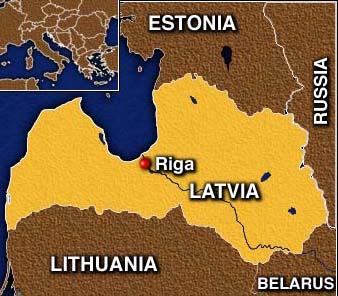Baltics plunge from top to bottom of European growth league
 Riga- The medium-term prospects for the economies of Latvia, Lithuania and Estonia are the worst in the European Union, according to a European Commission report released Monday.
Riga- The medium-term prospects for the economies of Latvia, Lithuania and Estonia are the worst in the European Union, according to a European Commission report released Monday.
Formerly known as the "Baltic Tigers" for their dynamic rates of GDP growth and ability to attract investment, all three countries are now little more than mewling pussycats if the downbeat EC economic survey is to be believed.
Latvia looks in the worst shape of the 27 EU member states with GDP set to contract 6.9 per cent in 2009 and a further 2.4 per cent in 2010.
During 2008 the Latvian economy already recorded a 2.3 per cent shrinkage as it slid into a deep recession after years of spectacular growth which peaked in 2006 at 12.2 per cent.
Unemployment will climb to more than 10 per cent during 2010, the EC added.
Such news will only add to fears that the riots that erupted in the Latvian capital, Riga, on January 13 over perceived governmental incompetence may not be the last civil strife to hit the country.
Lithuania, which experienced riots of its own on January 16 as new public spending cuts start to bite, is in nearly as bad shape as its northern neighbour, according to the EC, and will also see unemployment levels climbing.
"The economic outlook for Lithuania has deteriorated sharply, with the global economic and financial crisis contributing to the deepening of the domestic cyclical downturn," the Commission said.
Lithuania, which is the largest Baltic economy, is about to join Latvia and Estonia in recession. The EC predicted a GDP contraction of 4 per cent in 2009, which represents a serious reversal from 2008's 3.4 per cent growth rate.
Estonia is likely to be the first of the Baltic economies to emerge from recession, the Commission said. After shrinking 4.7 per cent in 2009 the economy will return to modest growth of 1.2 per cent in 2010, it predicted.
The three sets of figures represent significant downgrades of the EC's previous forecasts produced as recently as November 2008.
"Unemployment was a reason heavily used by people shouting at policemen during the riots of January 13," Nordea bank analyst Andris Laurins told Deutsche Presse-Agentur dpa Monday.
However, with governments in all three Baltic countries under fire from press and public alike there is a danger that tackling the causes of economic decline could slip down the agenda, he said.
"The main problem is that the spotlight is now on the political process, and people are not talking much about economic problems. The longer it takes to tackle political problems, the worse the outcome will be in the economy," he said. (dpa)